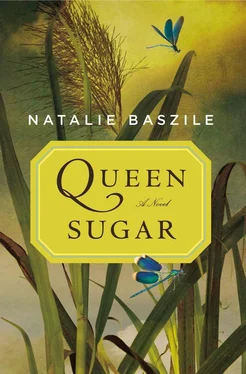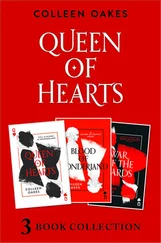As if on cue, the loan officer glanced up from her application. His skin was pale under the fluorescent lights, his expression grim as an undertaker’s. He tapped his pen against his chin.
“And you’re sure you don’t have any collateral?”
“I’m sure,” Charley said.
“Anyone willing to co-sign?”
Charley thought again of her mother. “No.”
The loan officer flipped the pages and frowned.
“My credit is decent,” Charley said, massaging her ring finger. “Not perfect, but certainly not the worst. I just need enough money to get through grinding.”
But the loan officer closed her file. “I’m sorry, Miss Bordelon. Since the meltdown, banks are more cautious than they used to be. I’ll do everything I can, but I can’t see how underwriting is going to approve this without you at least putting up some collateral. I’m afraid you present—”
“I know,” Charley interrupted. “Too much of a risk.” Every banker she had talked to from Saint Josephine to Baton Rouge had used that phrase. She gathered her backpack. She had begged the first three loan officers to reconsider; she was tired. “Thanks very much for your time.”
“I’m sorry I couldn’t do more,” the man said. “Good luck to you. And if you find a co-signer, I’d be happy to resubmit your application. My dad farmed sugarcane in the eighties, so I know what you’re up against.”
“I appreciate you saying that.”
He held the door open for her. “Well, be careful out there. The roads are still pretty dangerous.”
On the drive back to Miss Honey’s, staring out over fields that only three days before looked almost tropical in their lushness, Charley knew she should be grateful. She had the best two business partners anyone could ask for; she had her family; she had her health; and yet she was overcome with a sorrow so great she feared her chest would crack open. She pulled over to the side of the road and laid her head against the wheel. If only her father or Davis were there to tell her to keep going, or better yet, say it was all right to stop and rest for a while.
By the time Charley got back to Saint Josephine, it was evening, and the Quarters, buzzing with neighborly activity all summer, were quiet, Miss Honey’s street hushed now that school had started and folks had shifted into their autumn routines. Charley pulled up alongside the gully and parked. The yard was still a mess. Miss Honey stood in the window. By the time Charley reached the porch, she had opened the door.
“I thought you were Ralph Angel,” Miss Honey said, standing there in her faded housedress and slippers.
“Nope,” Charley said. “It’s just me.” Miss Honey looked tired. Her eyes weren’t bright as usual, her complexion washed out, her shoulders slumped. She tucked a wadded Kleenex in her pocket and Charley wondered if she’d been crying. “He hasn’t been home?”
“No,” Miss Honey said, sharply.
Two days since the storm and no sign of Ralph Angel; that was strange for a person who seemed interested in little more than hanging around the house. Driving home, Charley had noticed all the boarded-up stores and restaurants along Main Street, the owners still busy dragging tables and dishes, computers and racks of soggy clothes out to the sidewalk. Only the Winn-Dixie had opened for business. Charley set her backpack on the couch. “Where could he have gone?”
“How should I know?” Miss Honey snapped. “Do I look like a fortune-teller?” She took the Kleenex from her pocket and twisted it.
Stung, Charley stepped back. “I’m sorry.” In all the months she’d lived under Miss Honey’s roof, Miss Honey had never spoken harshly to her. Charley watched as Miss Honey went to the window again, pulled the curtains open, and peered out at the street. A little sigh of worry, almost a whisper, escaped her lips as she pressed her face to the glass.
“I know you’re worried about Ralph Angel, but I’m sure he’s fine,” Charley said. “He’s probably safe in a hotel somewhere, or he might even be driving home right now. I-10 is still jammed with all the people trying to get back from Arkansas and Mississippi. I should know — it took me twice as long to get back from Baton Rouge just now. How about if I call Hollywood? I’m sure he’d come over to clean up the yard.”
“The yard ain’t the problem! Can’t you see that?” Miss Honey flicked the curtains closed and turned toward Charley. “Ralph Angel is out there alone. He could be hurt or dead, for all we know. It’s time you starting thinking about someone other than yourself, girl. You’re not the only one who has problems, so stop all that whining.”
Charley was stunned. As many evenings as she’d come home from the farm with stories about her day, she’d never thought of it as complaining. If anything, she’d always thought Miss Honey was interested in her progress. “I didn’t realize I was whining. I apologize.”
“Well, you were,” Miss Honey said. “And I’m not in the mood for it. Not tonight.”
“Then I’ll get out of your hair,” Charley said, coolly, and thought of Violet, who twice had walked out of Miss Honey’s house. Now, she understood more than ever what Violet must have felt — the hurt, the anger, the deep sadness at being treated so badly for no reason she could see. Charley picked up her backpack. She’d clearly overstayed her welcome. It was like her father said: Never make people glad twice — glad to see you come, and glad to see you go. Charley walked through the dining room, past the china cabinet filled with cut-glass figurines and milky green cups and saucers, the ones Miss Honey collected from oatmeal boxes decades ago, and was almost at the kitchen door when Miss Honey called out.
“I’m responsible for that boy.”
Charley turned. “Ralph Angel is a grown man.”
“That’s not what I mean.” Miss Honey sat on the edge of the couch. She closed her eyes, and for a moment Charley thought she was praying. “Lord, forgive me for what I’ve done,” she said.
Charley walked back into the living room and sat down. Outside, the sun had set, and beyond the sheer curtain, twilight, soft and purply, pressed against the window.
They sat in the silence as the living room grew darker, until finally, Miss Honey said, “Ernest felt guilty for getting that girl pregnant and causing her to lose her scholarship,” and it took Charley a few seconds to figure out that Miss Honey was talking about Emily, the girl Ernest had dated in high school, Ralph Angel’s mother. “He wanted to marry her and stay here in Saint Josephine, but I wouldn’t allow it,” Miss Honey said. “I couldn’t bear the idea of Ernest giving up his dream, especially after what LeJeune did to him. I told him to leave Emily, go out to California like he planned, and when the baby was born, I’d help her take care of it.” Miss Honey dabbed her nose. “Ernest wanted to take Emily with him. But I knew she’d weigh him down. Something about her wasn’t right — she was smart, but fragile as a little bird. Ernest needed a fighter, a woman strong enough to stand with him against the world. So I offered Emily’s family two thousand dollars — all the money I had — to keep her away until Ernest left town. Emily’s parents were sharecroppers. Two thousand dollars was a lot of money.” Miss Honey stopped talking and stared out the window. “I think the strain of taking care of a child made Emily’s condition worse.”
“If you knew she was struggling, why didn’t you help her?”
“I tried,” Miss Honey said. “I wanted to keep my promise. But her folks told her what I did, how I sent Ernest away and paid them, and she was so angry with me, she wouldn’t let me near Ralph Angel when he was born. Not for two whole years, and by then, she was having all kinds of trouble. They put her in Charity Hospital for a while and that helped, but she wouldn’t stay. The only way I got to see Ralph Angel was when Ernest came home to visit. He brought Ralph Angel over here every day — such a pretty little boy. I’d hold him and rock him like he was my own. But when Ernest went back to college, he had to take Ralph Angel back to Emily, and I wouldn’t see him again until the next summer. I heard about all the jobs Emily lost, how she struggled. It weighed on my heart. But she was Ralph Angel’s mama. I didn’t have custody.”
Читать дальше












